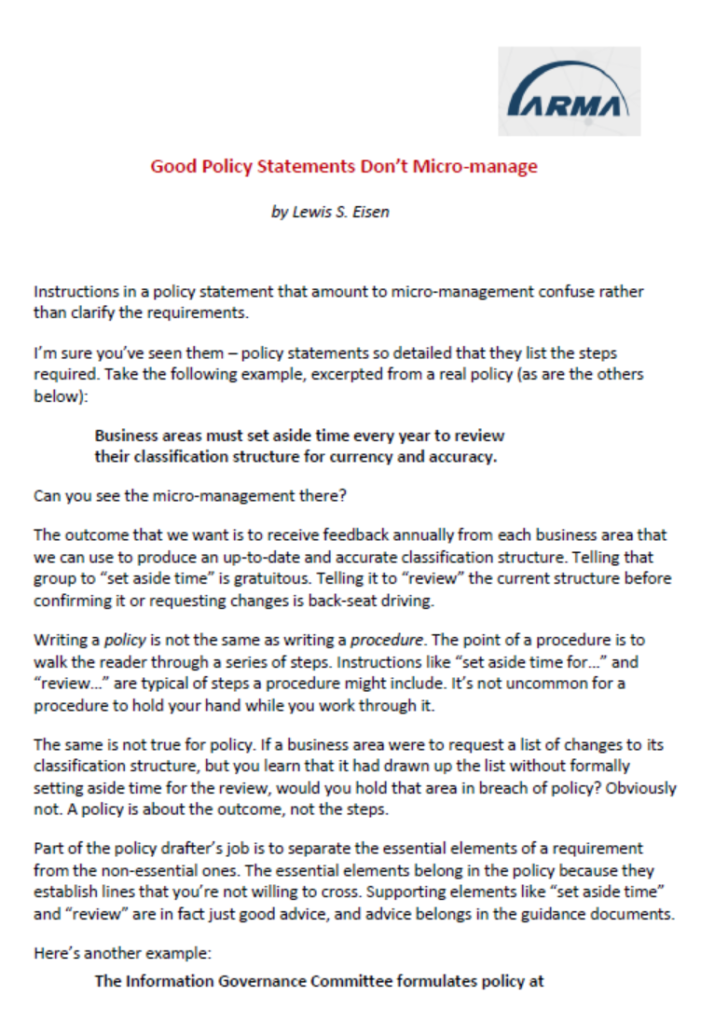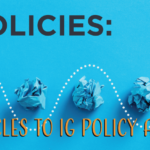Good Policy Statements Don’t Micro-manage

Instructions in a policy statement that amount to micro-management confuse rather than clarify the requirements.
I’m sure you’ve seen them – policy statements so detailed that they list the steps required. Take the following example, excerpted from a real policy (as are the others below):
Business areas must set aside time every year to review
their classification structure for currency and accuracy.
Can you see the micro-management there?
The outcome that we want is to receive feedback annually from each business area that we can use to produce an up-to-date and accurate classification structure. Telling that group to “set aside time” is gratuitous. Telling it to “review” the current structure before confirming it or requesting changes is back-seat driving.
Writing a policy is not the same as writing a procedure. The point of a procedure is to walk the reader through a series of steps. Instructions like “set aside time for…” and “review…” are typical of steps a procedure might include. It’s not uncommon for a procedure to hold your hand while you work through it.
The same is not true for policy. If a business area were to request a list of changes to its classification structure, but you learn that it had drawn up the list without formally setting aside time for the review, would you hold that area in breach of policy? Obviously not. A policy is about the outcome, not the steps.
Part of the policy drafter’s job is to separate the essential elements of a requirement from the non-essential ones. The essential elements belong in the policy because they establish lines that you’re not willing to cross. Supporting elements like “set aside time” and “review” are in fact just good advice, and advice belongs in the guidance documents.
Here’s another example:
The Information Governance Committee formulates policy at
the broadest levels first and then moves to the development of
more specific policy until the matter has been addressed to its
satisfaction.
Again, as well-intentioned as this statement might be, it crosses the line. Rather than reporting a decision made by the powers-that-be, it reads more like a set of instructions telling you how to go about your work.
The telltale sign is the closing clause “until the matter has been addressed to its satisfaction.” Kinda sounds like your mom telling you that you can’t go out to play until all your homework is done, doesn’t it?
These examples are a manifestation of the parental tone of voice that many information management (IM) and other administrative policies take. (See Eisen, Lewis. Have You Considered Tone of Voice? ARMA Magazine. December 5, 2019.) Instead of addressing the reader as an adult, the wording evokes a parent–child dynamic, coming off a little over-bearing if not downright bossy. It may be true that common sense isn’t as common as we’d like it to be, but that doesn’t mean that policies should be drafted with the assumption that people won’t do the right thing unless they’re led by the nose.
Here’s a third example, one that I come across all too often:
Employees must read, understand, and sign this policy.
This statement over-reaches the objectively observable outcome that we want here. Do we actually want to monitor the employee reading the document? Unlikely. What we really want is the employees to assure us that they understand and are bound by the terms of the policy. Obviously, before understanding and being bound by the policy, competent individuals would want to read through it first, and if they didn’t understand something they would ask questions.
In the long term, we can compare an employee’s actions against policy requirements. For the moment, however, what we want is reliable evidence the employee feels ready to move forward. That evidence could be anything from an oral acknowledgement to the employee’s signature on a copy of the document. Dictating that people need to read and understand something before signing it brings us back to the parent–child dynamic that we’re trying to avoid. That dynamic does not engage the reader and does not invite compliance.
When people need specific instructions to be able to complete their tasks, you can put those instructions in your guidance documents. In an instructional document, steps and procedures provide clarity; in a policy they create clutter.
Removing the micro-management from your policies will help make them more concise and more respectful at the same time.

View the PDF version of this article.
[ls_content_block id=”682″]
About the Author

- Lewis S Eisen, JD CIP SIPC is the developer of the Perfect Policies™ approach to using respectful language in policy drafting, which has been adopted in organizations around the world. His international bestseller Rules: How to Write Rules that People Want to Follow, is now in its third edition and is also available in French. Lewis draws on 40 years’ experience as a practising lawyer, business consultant, and federal civil servant. Lewis was the winner of the ARMA International Britt Literary Award in 2020.




